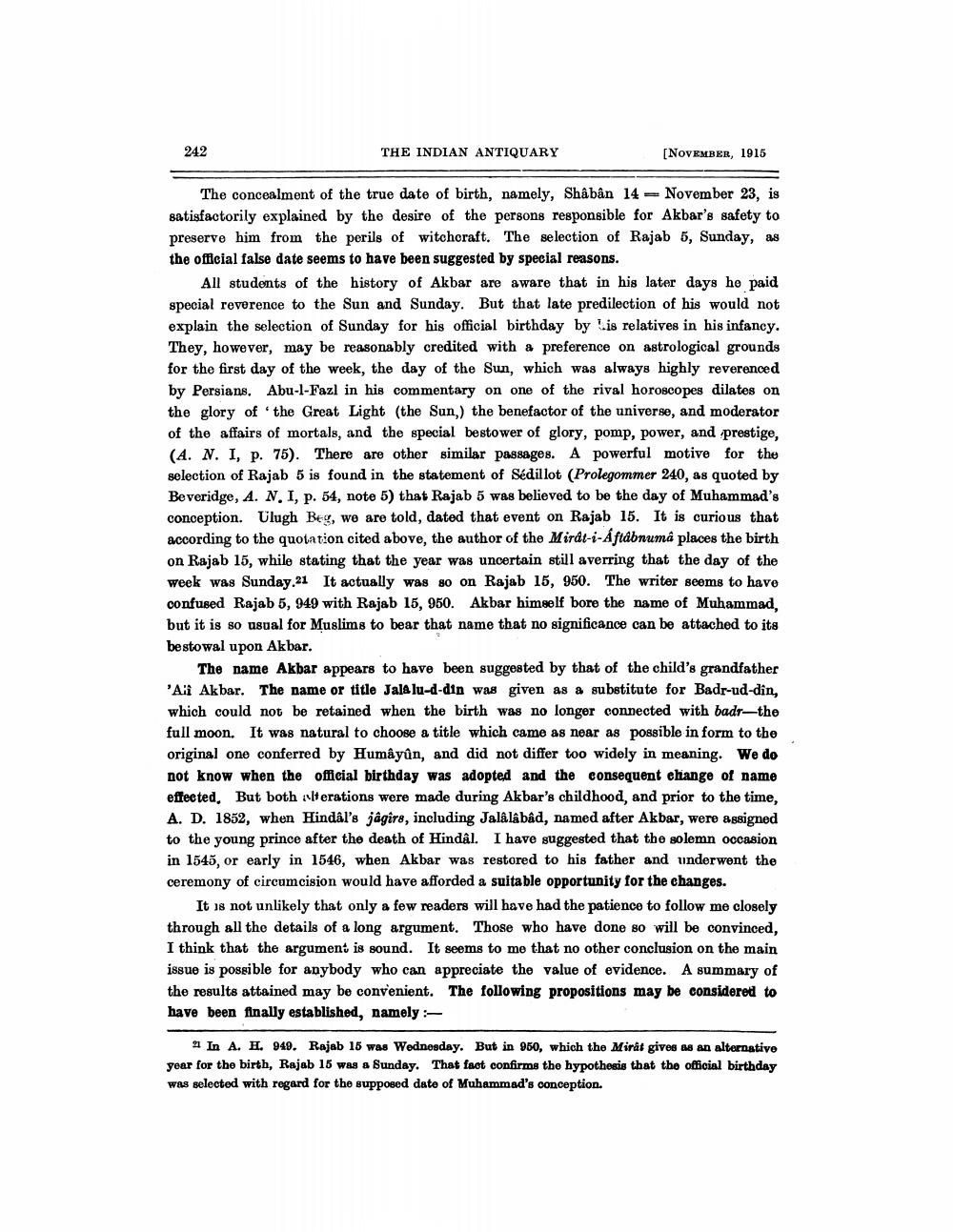________________
242
THE INDIAN ANTIQUARY
[NOVEMBER, 1915
The concealment of the true date of birth, namely, Shâbân 14 November 23, is satisfactorily explained by the desire of the persons responsible for Akbar's safety to preserve him from the perils of witchcraft. The selection of Rajab 5, Sunday, as the official false date seems to have been suggested by special reasons.
All students of the history of Akbar are aware that in his later days he paid special reverence to the Sun and Sunday. But that late predilection of his would not explain the selection of Sunday for his official birthday by his relatives in his infancy. They, however, may be reasonably credited with a preference on astrological grounds for the first day of the week, the day of the Sun, which was always highly reverenced by Persians. Abu-l-Fazl in his commentary on one of the rival horoscopes dilates on the glory of the Great Light (the Sun,) the benefactor of the universe, and moderator of the affairs of mortals, and the special bestower of glory, pomp, power, and prestige, (A. N. I, p. 75). There are other similar passages. A powerful motive for the selection of Rajab 5 is found in the statement of Sédillot (Prolegommer 240, as quoted by Beveridge, A. N. I, p. 54, note 5) that Rajab 5 was believed to be the day of Muhammad's conception. Ulugh Beg, we are told, dated that event on Rajab 15. It is curious that according to the quotation cited above, the author of the Mirdt-i-Aftabnumâ places the birth on Rajab 15, while stating that the year was uncertain still averring that the day of the week was Sunday 21 It actually was so on Rajab 15, 950. The writer seems to have confused Rajab 5, 949 with Rajab 15, 950. Akbar himself bore the name of Muhammad, but it is so usual for Muslims to bear that name that no significance can be attached to its bestowal upon Akbar.
The name Akbar appears to have been suggested by that of the child's grandfather 'Ali Akbar. The name or title Jala lu-d-din was given as a substitute for Badr-ud-din, which could not be retained when the birth was no longer connected with badr—the full moon. It was natural to choose a title which came as near as possible in form to the original one conferred by Humâyûn, and did not differ too widely in meaning. We do not know when the official birthday was adopted and the consequent change of name effected. But both alterations were made during Akbar's childhood, and prior to the time, A. D. 1852, when Hindal's jagirs, including Jalâlâbâd, named after Akbar, were assigned to the young prince after the death of Hindal. I have suggested that the solemn occasion in 1545, or early in 1546, when Akbar was restored to his father and underwent the ceremony of circumcision would have afforded a suitable opportunity for the changes.
It is not unlikely that only a few readers will have had the patience to follow me closely through all the details of a long argument. Those who have done so will be convinced, I think that the argument is sound. It seems to me that no other conclusion on the main issue is possible for anybody who can appreciate the value of evidence. A summary of the results attained may be convenient. The following propositions may be considered to have been finally established, namely :
2 In A. H. 949. Rajab 16 was Wednesday. But in 950, which the Mirat gives as an alternative year for the birth, Rajab 15 was a Sunday. That fast confirms the hypothesis that the official birthday was selected with regard for the supposed date of Muhammad's conception.




